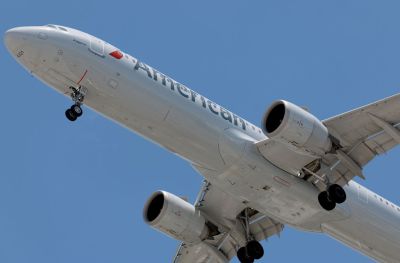Reauthorizing the Federal Aviation Administration (FAA) every few years is typically a routine congressional act. But this year, a shortage of airline pilots is contributing to widespread cancellations and chaos at American airports, and lawmakers are sparring over proposed solutions FAA reauthorization could codify.
With current authorizations set to expire on September 30, achieving consensus on aviation issues will be one of the top items on Congress’ to-do list once it returns from the August recess that began today.
Though multiple factors have contributed to the pilot shortage, one of the most commonly cited is airline carriers’ decision in the early days of the COVID-19 pandemic to offer pilots and other employees early retirement packages as a cost-cutting measure. After more workers than expected took those offers, and as travel increased as the pandemic eased, demand for flights has outstripped the supply of crews.
A grassroots group of pilots is now asking Congress to mitigate the problem by making one simple change: Raising the mandatory retirement age for airline pilots from 65 to 67. Despite opposition from the largest pilots’ union in the world (the Air Line Pilots Association, or ALPA) and the skepticism of union-friendly Democrats, they’re making progress.
The House’s version of the FAA reauthorization legislation included an amendment by Texas Rep. Troy Nehls, whose brother is a pilot, to raise the retirement age. Democrats on the House Transportation and Infrastructure Committee initially voted against adding Nehls’ amendment, but the bill itself passed the full chamber last week with a large, bipartisan majority.
“That bill that started out as a grassroots effort to raise the age from 65 to 67 that we’ve worked so hard to insert has suddenly found huge bipartisan support,” says Barry Kendrick, a pilot who was recently forced to retire from airline flights due to the rule and the president of a nonprofit group advocating for the policy change. “And now the Senate is taking on the same issue.”
The FAA first introduced the “Age 60 Rule” in 1959, purportedly for safety reasons, though backroom political dealing surrounding American Airlines’ eagerness to recruit young ex-military pilots may have also played a role. For years afterward, ALPA opposed the rule, arguing it constituted age discrimination. In 2007, Congress raised the age to 65 by a unanimous vote, putting the U.S. in line with an emerging international standard.
At the time, ALPA praised Congress’ decision despite having opposed it before the vote. Today, its tune is different. The Let Experienced Pilots Fly Act “will complicate airline operations, add to costs and delays, disrupt collective bargaining agreements, and has not been validated by the FAA,” the groups says. The Biden administration’s position is more restrained but comes to the same conclusion: “Making this change without doing research and establishing any necessary policies would be outside the international standard,” the White House said in a statement of policy last week.
But Kendrick’s group argues that this is misleading, and that there is plenty of evidence that pilots flying over the age 65 is safe: Canada, Japan, Australia, New Zealand and other countries allow it without incident. U.S. pilots are tested on their competence in advanced simulators every six to nine months, and those over the age of 40 undergo additional medical testing frequently. And since the profession as a whole skews slightly older than the American workforce, Kendrick has been telling congressional offices that “the area you need to be concerned about is not safety on the upper age limit, it’s the safety on the lower age limit.”
“Due to the pilot shortage, inexperienced pilots are being forced into these captain positions at a faster rate than their experience will allow them to get,” he says. “Experience matters.”
While pilots older than 65 currently wouldn’t be able to fly internationally due to the International Civil Aviation Organization’s (ICAO) rules, domestic flights are where the demand is most pressing. It’s plausible that ICAO would adjust its rules to catch up to the United States, as happened after the Age 60 Rule was originally introduced. The International Air Transport Association, which represents airlines across the world, supports such a change, and the age limitations issue is on the agenda for an ICAO conference in Montreal next month.
Kendrick insists that this shouldn’t be a partisan issue, and that his group isn’t motivated by anti-union politics. “We are all proud union members and agree with our unions on many issues—just not this one,” he says.
But the group agrees that ALPA has gotten this issue wrong, letting its desire to secure good contracts for younger pilots outweigh the interests of more experienced pilots as well as the “flying public.”
Republicans have tended to embrace the issue more eagerly than Democrats, who have been more wary of bucking ALPA’s position. But the effort in the Senate, led by South Carolina Republican Lindsey Graham, has at least two Democratic co-sponsors—Joe Manchin of West Virginia and former naval aviator and astronaut Mark Kelly of Arizona. And that may be enough to get the final, bipartisan product to the president’s desk with the age-raising provision intact.
“We’re working on it every day,” Graham tells The Dispatch. “I think it will help the consumer a lot.”
In addition to the retirement age issue, the Senate will consider another amendment meant to address the pilot shortage after its August recess. Sens. John Thune and Kyrsten Sinema propose allowing 150 hours of simulator training to count toward the 1,500 hours of total training required to become a pilot. Disagreement over that idea among the members of the Commerce Committee has been a major sticking point delaying the Senate’s action on the broader FAA legislation.
Impeachment Inquiry: Procedural Power or Political Peril?
With intraparty bickering preventing the House from passing one of the two appropriations bills Republican leaders had hoped to send to the Senate before leaving town, you may have thought House Speaker Kevin McCarhty would seem defensive.
Quite the opposite. In addition to touting their legislative achievements, McCarthy and his GOP leadership team highlighted their three main investigations into Biden family members and officials and even opened another potential salvo: the possibility of an impeachment inquiry against President Joe Biden.
McCarthy seemed to temper those expectations on Thursday, scolding reporters who asked him about impeachment itself rather than an impeachment inquiry, which could enhance the House’s investigative power.
“You guys get hung up on the name of it,” he told reporters. “If you do an impeachment inquiry, it doesn’t mean anything—that you’re gonna go to impeachment. All it does is, it empowers the duty to your subpoenas to be answered.”
As investigations in the House Oversight, Judiciary, and Ways and Means committees proceed, so too does a Department of Justice investigation into Hunter Biden’s misdeeds, which at times has made it difficult for GOP investigators to access evidence they want. But an impeachment inquiry could change that.
According to a Congressional Research Service report prepared during former President Donald Trump’s first impeachment, “an impeachment investigation may, relative to a traditional oversight investigation, provide the House with a stronger legal position in litigation to obtain information from the executive branch.”
“Think of this: If the federal government is now saying … they still have an open case against the Bidens, when we want to go investigate somebody or get answers, they’ll say, ‘No I can’t I’ve got an open case,’” McCarthy said Thursday. “But an impeachment inquiry then gives us the power just to investigate.”
The right flank of McCarthy’s conference is eager to pursue impeachment—and officially opening an inquiry would be a significant step down that road. But this week’s appropriations turbulence is more proof that the House GOP is still fractious. While a military construction and veterans affairs measure made it across the finish line on a near-party-line vote in the House, the bill covering agriculture and the FDA was held up by dissension within the GOP over an abortion-related amendment.
The GOP majority may be too slim and divided to approve an impeachment inquiry, unless conclusive evidence emerges personally linking the president to his family’s alleged crimes.
On the Floor
The House is out for six weeks, the Senate for five.






Please note that we at The Dispatch hold ourselves, our work, and our commenters to a higher standard than other places on the internet. We welcome comments that foster genuine debate or discussion—including comments critical of us or our work—but responses that include ad hominem attacks on fellow Dispatch members or are intended to stoke fear and anger may be moderated.
With your membership, you only have the ability to comment on The Morning Dispatch articles. Consider upgrading to join the conversation everywhere.